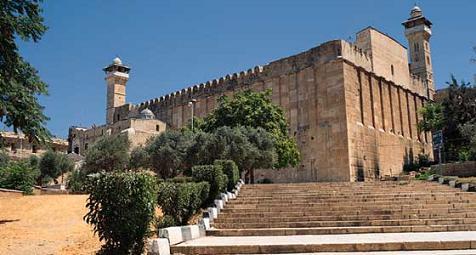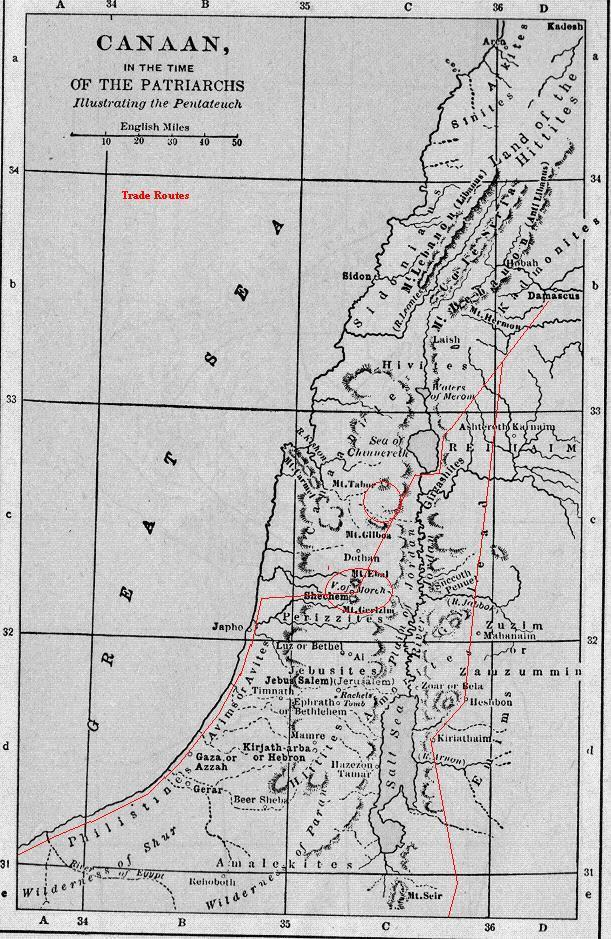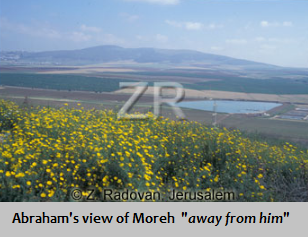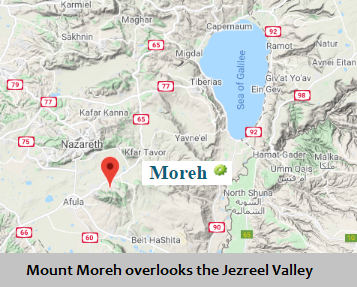|
After Jacob had given his blessings to his sons...
49:29
"...he charged them, and said unto them, I am to be gathered unto
my people: bury me with my fathers in the cave that is in the field of
Ephron the Hittite. In the cave that is in the field of Machpelah, which
is before Mamre, in the land of Canaan, which Abraham bought with
the field of Ephron the Hittite for a possession of a burying place.
There they buried Abraham and Sarah his wife; there they buried
Isaac and Rebekah his wife; and there I buried Leah. The purchase
of the field and of the cave that is therein was from the children of
Heth."
50:7
"And Joseph went up to bury his father: and with him went up
all the servants of Pharaoh, the elders of his house, and all the elders
of the land of Egypt. And all the house of Joseph, and his brethren,
and his father's house: only their little ones, and their flocks, and
their herds, they left in the land of Goshen. And there went up with
him both chariots and horsemen: and it was a very great company.
And they came to the threshing floor of Atad, which is beyond
Jordan, and there they mourned with a great and very sore
lamentation; and he made a mourning for his father seven days.
And when the inhabitants of the land, the Canaanites, saw
the mourning in the floor of Atad, they said, 'This is a grievous
mourning to the Egyptians; wherefore the name of it was called
Abel-mizraim, which is beyond Jordan.
And his sons did unto him according as he commanded them; For
his sons carried him into the land of Canaan, and buried him in the
cave of the field of Machpelah, which Abraham bought with the
field for a possession of a burying place of Ephron the Hittite, before Mamre."
We, too... are being brought to Jacob's burial site... the place that had
been chosen to become the burial ground of Abraham's tribe... the place
that can genuinely be called "Abraham's holy mountain."
Just where is it... that this burial ground is... this burial ground of
Hebrew kings? Tradition tells us that it is near Hebron, where Abraham
had established his camp. But, we have been given contradictory
descriptions of this burial ground. The threshing floor of Atad,
"beyond the Jordan" would have been east of the Jordan if one
were traveling from Egypt... Hebron was west and south.
This contradiction has been attributed to... where the author of Genesis
was, (Moses), when he was writing this story. Another source has said
that this threshing floor was located between the Jordan and Jericho...
west of the Jordan. Still another source, naming the threshing floor of
Atad "the threshing floor of the buckthorn"... states that this place
cannot be identified with certainty.
The official site of Abraham's tomb is north of Hebron, shown below.
This is described at Wikipedia.org as
"Cave of the Patriarchs."

And so, if Jacob was buried with his fathers... he, too, would be buried here.
There is no question that Joseph followed his father's command...
to be buried with Abraham and Isaac. The burial sites are all one and the
same... making it indeed the site of a tribal burial ground... making the
site one of the most important and holy sites in Israel.
But... it isn't likely that the real site is at Hebron.
We seem to be drawn towards Jerusalem... Mount Moriah... and the
Temple. So... let's look at Jerusalem.
"Jerusalem" means... "the habitation of peace."
The Tel-el-Armana clay tablets... letters sent between Egypt and Jerusalem
around 1500 B.C.... show that even at that time the city was called
"Jerusalem," although sometimes this was shortened to "Salem."
The earliest reference to Salem in the scriptures is at
Genesis 14:18 when Melchizedek, the king of Salem, honored
Abraham's successful rescue of the inhabitants of the local cities.
Those cities included Sodom and Gomorrah... which included Lot's family.
We can know from this... that these cities ere all sister cities of Jerusalem.
Abraham's only interest was in rescuing Lot's family. Abraham lived
elsewhere.
King David conquered the Jebusites to win Jerusalem.
At Joshua 18:28, Judges 1:21, and Judges 19:10, Jerusalem
was called "Jebusi," and was part of the land given to the tribe of Benjamin.
Judah and Simeon conquered Jerusalem, but the tribe of Benjamin did
not drive out the Jebusites, Judges 1:21 but dwelt with them
"to this day." In Joshua 10:5, the inhabitants of Jerusalem
are called Amorites.
Jerusalem is located 40 miles east of the Mediterranean Sea and
20 miles west of the Salt Sea and the Jordan River. It sits on a dry
limestone plateau which is the most broad ridge in the range that
extends through the whole of the country. The hills of Jerusalem
form a rough triangle. This plateau is cut off from the surrounding
countryside by deep ravines on the west, south, and east...
which provided an impregnable protection against siege.
Another virtue that has made Jerusalem so defendable is the ability
to retain water through its springs and reservoirs, while the country
surrounding it is devoid of water... causing difficulty for any
encampments by invading armies. Jerusalem also sat outside of the
great thoroughfares of Palestine, over which the caravans and armies
came and went between Assyria and Egypt.
It was... simply... a safe haven with ample fresh water.

Abraham never lived in Jerusalem.
Isaac never lived in Jerusalem.
Jacob never lived in Jerusalem.
Moses never lived in Jerusalem.
"Mount Moriah", however, somehow became associated with Jerusalem.
It was King David who set his sights on Jerusalem.
And, so... this assumed location of Mount Moriah was declared a holy
site, and Solomon built his temple on it.
Jerusalem had been of no importance whatsoever, until the time of
David.
And then... Jerusalem... and the temple with it... became the major
cause of the division of the tribes of Israel. David and Solomon were
of the tribe of Juda... taking hold in the territory of Benjamin... using
the other tribes in forced labor... to build a grand temple...
which Solomon defiled. The claim of David... to hold the throne in
perpetuity... became a contentious thing among the tribes. They
divided and became two nations. It is this division of Israel that
made it vulnerable to seige.
Jerusalem destroyed the nation of Israel.
Returning to the subject of Abraham's tribal burial site in
Canaan...
Abraham paid a king's ransom...
for a field and the mount at the end of the field.
23:2
"And Sarah died in Kirjatharba; the same is Hebron in the land of
Canaan: and Abraham came to mourn for Sarah, and to weep for her.
And Abraham stood up from before his dead, and spake unto the sons
of Heth, saying, I am a stranger and a sojourner with you: give me a
possession of a burying place with you, that I may bury my dead
out of my sight.
And the children of Heth answered Abraham, saying unto him,
Hear us, my lord: thou art a mighty prince among us: in the choice
of our sepulchres bury thy dead; none of us shall withhold
from thee his sepulchre, but that thou mayest bury thy dead.
And Abraham stood up, and bowed himself to the people of the
land, even to the children of Heth. And he communed with them, saying,
If it be your mind that I should bury my dead out of my sight; hear me,
and intreat for me to Ephron the son of Zohar, that he may give me the
cave of Machpelah, which he hath, which is in the end of his field;
for as much money as it is worth he shall give it to me for a possession of a
buryingplace amongst you.
And Ephron dwelt among the children of Heth: and Ephron the Hittite
answered Abraham in the audience of the children of Heth, even of all
that went in at the gate of his city, saying,
Nay, my lord, hear me: the field give I thee, and the cave that is
therein, I give it to thee; in the presence of the sons of my people give
I it thee: bury thy dead.
And Abraham bowed down himself before the people of the land.
And he spake unto Ephron in the audience of the people of the land,
saying, But if thou wilt give it, I pray thee, hear me:
I will give thee money for the field; take it of me, and I will bury
my dead there. And Ephron answered Abraham, saying unto him,
My lord, hearken unto me: the land is worth four hundred
shekels of silver; what is that betwixt me and thee? bury therefore
thy dead.
And Abraham hearkened unto Ephron; and Abraham weighed to
Ephron the silver, which he had named in the audience of the sons
of Heth, four hundred shekels of silver, current money with the
merchant. And the field of Ephron, which was in Machpelah,
which was before Mamre, the field and the cave which was therein,
and all the trees that were in the field, that were in all the borders
round about, were made sure unto Abraham for a possession in the
presence of the children of Heth..."
This must have been a very special field, indeed.
So... where was this very valuable piece of property?
We must reflect on the events as they happened
in the sojourn of Abraham in Canaan... when he first arrived...
12:6
"And Abram passed through the land unto the place of Sichem,
unto the plain of Moreh. And the Canaanite was then in the land.
And the Lord appeared unto Abram, and said, Unto thy seed
will I give this land: and there builded an altar unto the Lord,
who appeared before him."

 Map of Moreh,
from: biblebento.com/maps/BL818
Map of Moreh,
from: biblebento.com/maps/BL818
And so... we see that it was at the hill of Moreh... and near the
plain of Moreh... that God first spoke to Abraham... and declared
that the land before him would be his. The plain of Moreh is
a large and beautiful plain. One can stand on the Hill of Moreh
and see far into the distance. Mt. Tabor sits across the plain which
is an arm of the Valley of Jezreel... the bread basket of Israel.
Today, the Hill of Moreh is the site of many tombs. See the
maps of Canaan where Moreh is said to be located.
It is associated with the name Nebi Dahi.
See Moreh online:
from: biblelandpictures.com
also from: biblelandpictures.com
from: openbible.info
Lot described this area as similar to the land of Egypt... a garden of beauty.
13:10
"And Lot lifted up his eyes, and beheld all the plain of Jordan,
that it was well-watered every where, before the Lord destroyed
Sodom and Gomorrah, even as the garden of the Lord, like the
land of Egypt, as thou comest unto Zoar."... "And Lot journeyed east."
Abraham went the opposite way... south... as he had agreed to do.
22:2
"And the Lord said, Take now thy son, thine only son Isaac, whom
thou lovest, and get thee into the land of Moriah; and offer him there
for a burnt offering upon one of the mountains which I will tell
thee of. And Abraham rose up early in the morning, and
saddled his ass, and took two of his young men with him, and Isaac
his son, and clave the wood for the burnt offering, and rose up, and
went unto the place of which God had told him."
It very much appears as though we are again reading about the
Hill of Moreh... the site of Abram's first altar to God. We must
remember that the Old Hebrew did not contain vowels. Vowels
were not inserted into the texts until the sixth century A.D.
Moreh and Moriah are much too similar to be
well-distinguished from each other.
The translation of this section of text at first says "which I will tell you of"
and even though nothing is revealed between this quote and the next...
the text says "the place of which God had told him." Is it too much of a
strain... to think that this meant "the place where God talked to him"?
There is a real connection with Abraham and the plain of Moreh...
when there is no connection whatsoever to Jerusalem and a
"hill of Moriah" in that Jebusite stronghold. In fact, there is a very
strong connection to Moreh. Moreh is the site where God gave
Abram the land of Canaan. Moreh was most beautiful and desirable.
But... Abram did not stay... because "the Canaanite was there."
He could not take it without force. He could have taken it...
but he did not.
It is not a stretch to deduce that... it is Moreh that is the desire of
Abram's heart... and not the plain to the south near Hebron...
where he settled. Abram... always lived in a tent, and moved from
Hebron to Beersheba. It is never mentioned that he built a permanent house there. Even Jacob "lived among the tents." The tribe did not establish
themselves in a large way... nor name a town after themselves... or any
of the signs that verify that a claim had been made on territory.
When Abram awoke on the morning of the destruction of Sodom
and Gomorrah... "he looked toward Sodom and Gomorrah, and
toward all the land of the plain, and beheld, and, lo, the smoke of the
country went up as the smoke of a furnace." Sodom and Gomorrah
was one of the cities of the plain.
When Sarah died... Abraham made his move to take his holy place...
the beautiful plain of Moreh and the hill beyond it... the place God
promised to him... to give to him and his descendents. He went to buy
it. He paid a king's ransom for it, when it had been offered to him for
free. He didn't want just a cave for Sarah... he wanted a place to
claim for his own burial and for the burial place of his descendents.
This would permanently establish him in Canaan. He would own the
field and the hill, but he would not make the move to live there.
When he made his request, he spoke to the entire community.
This was not a small business arrangement... this was a major land
purchase. When he had rescued the inhabitants of the cities with Lot...
he had earned unfailing respect of these people... and had asked for
nothing in return. When he made his plea "to bury my dead away
from me" this could not have been his home ground near Hebron.
He had been in Hebron long enough to seek out a suitable tomb to
bury himself and Sarah without a major arrangement. Only Moreh
makes sense in the light of all of these things.
One must also consider the fact that Abraham had most surely had
to bury some of those who served him and were part of his tribe.
There surely must have been a place where he buried them... buried
them in tombs. He could have buried Sarah in any available tomb
without so much as a whisper to the local people. But... Abraham
was buying his special place. He was buying Moreh.
Machpelah means "double."
In the design of the Tabernacle of God... the instructions of which
were given to Moses in those "commandments" on the mountain...
are many "doubles." The dimensions of the tent... the tent door...
the priest's breastpiece... all contain a "doubling" aspect.
Many of the tombs in Egypt were tombs set behind other rooms...
hidden deeply in the mountain. When a king was buried, it was
important to protect the tomb from thieves looking for treasures,
and thus the need to camoflauge or hide the actual tomb. It is also
possible that another person who had died would be buried in order
to distract the presence of another tomb nearby.
When Jacob was buried, the mourning went on for many days.
One can imagine that this made noise, along with all the activity
of the many people who had come. This activity would have enabled
a secret burial of this very important person who was being buried...
so that the Canaanites would not know for sure where the tomb was.
If the plain of Moreh was near to the great highway to Egypt...
the actual burial might have taken place before the group's
arrival at the threshing floor of Atad... near the Jordan... near a plain
where grain was grown.
Ezekiel's vision of the cherubim says this:
1:13
"As for the likeness of the living creatures, their appearance was like
burning coals of fire, and like the appearance of lamps: it went up and
down among the living creatures; and the fire was bright, and out
of the fire went forth lightning. And the living creatures ran and
returned as the appearance of a flash of lightning."
This could well describe what a laser is... and what it does.
Cherubim were a part of the Ark of the Covenant. They lifted up the
throne that was a cover to the base... the box that held the tablets of
Moses. Cherubim are mentioned in three instances in the scriptures.
The first... they guard the way to the Garden of Eden.
Second... they support the throne on the ark.
Third... they appear in the dream of Ezekiel.
Thus... they guard the way to the tree of life... and they lift up the throne.
Ezekiel was only describing what those cherubim actually are.
To theorize wildly... the
ark of the covenant ...
similar to a box that might have carried Jacob's body back to Canaan...
a gold-covered object buried in the hill of Moreh... could guide the way
to the true burial grounds of Abraham, Isaac, and Jacob. It could mark
the place where the tablets of the history of the tribe of Adam is
buried... like a book of life. It is gold... bound in pitch...
and buried with them. And it can be found with the power
of a laser.
Ezekiel's dream clarifies several things having to do with the
dimensions of the ark and other details of the instructions to Moses.
One can wildly deduce... that it is the Tent of God that is to be rebuilt...
not the lavish temple that was built by Solomon with the enslavement of his brother tribes.
The instructions given to Moses... to build these things... were serious
enough for them to be called commandments. These are manifestations
of truths... they depict truth... and they would need to be seen.
But... a temple? God had commanded that his altar was not to
be touched by swords or violence. The Tabernacle of God
was a tent... for a Living God... not a tomb.
The Passover Lamb was a lesson in respect for the animals killed
for human sustenance. Nothing was to be left uneaten, wasted,
or thrown away.
The God of Abraham was the God of Noah...
who was given a clear directive against violence.
Abraham had the means and the ability to take Canaan by force...
but did not.
He bought it.
The name "Israel" means... "he strives with God and
prevails."
"Israel" was Jacob's name during his enslavement.
This is the name he gave to the nation of his errant sons.
It was Jacob... who gave them laws to live by...
To teach them... honor...
Who planned their return to Canaan from Egypt.
They would serve him in a way they did not know...
They would carry the great and noble legacy of Abraham...
The legacy of peace... dignity... love... honor...
Until the day that the truth would be seen...
And they would repent... on behalf of their violent forefathers...
Who had betrayed that noble legacy of Abraham...
Betrayed Jacob, their father...
And in the pursuit of power and treasure
Destroyed the true legacy of this princely tribe...
Who had all been disowned by Jacob... the king of their tribe...
Who inherited NOTHING from him but his remorse...
And choose... non-violence... and peace...
And know the truth...
And become true sons... of Abraham, Isaac, and Jacob...
Inheritors of a noble legacy... of true kings of the earth...
A legacy that is a great gift to all mankind.
|
|
